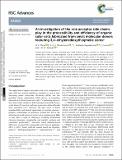An investigation of the role acceptor side chains play in the processibility and efficiency of organic solar cells fabricated from small molecular donors featuring 3,4-ethylenedioxythiophene cores
Abstract
Organic photovoltaic devices fabricated from small molecular donors continue to receive significant interest due to their desirable properties such as convenient synthesis, purification and batch-to-batch reproducibility. In this study, we have synthesized two small molecules based on an alternating A-D-A structure, utilizing a central EDOT donor moiety and either 2-ethylhexyl cyanoacetate ( SAM-80 ) or N-(2-ethylhexyl)cyanoacetamide ( SAM-72 ) units as acceptor termini. The small molecules were incorporated into bulk heterojunction solar cells with PC71BM . Our investigations have shown that the side chains utilized for SAM-80 only allow for solution processing using volatile solvents, such as chloroform, which limits the reproducibility of device fabrication. However, SAM-72 displays better solubility and devices fabricated using a SAM-72:PC71BM active layer reached average power conversion efficiencies of 1.9%, with fill factors reaching 60%. Post-processing methods such as thermal and solvent vapor annealing were found to significantly increase the stability of devices, but were not able to improve overall device performance.
Citation
Mica , N , Almahmoud , S A J , Krishnan Jagadamma , L , Cooke , G & Samuel , I D W 2018 , ' An investigation of the role acceptor side chains play in the processibility and efficiency of organic solar cells fabricated from small molecular donors featuring 3,4-ethylenedioxythiophene cores ' , RSC Advances , vol. 8 , no. 69 , pp. 39231–39240 . https://doi.org/10.1039/C8RA07034B
Publication
RSC Advances
Status
Peer reviewed
ISSN
2046-2069Type
Journal article
Description
The authors are grateful for funding from EPSRC under grant codes EP/L012294/1, EP/L012170/1 and EP/L015110/1. Sondos Abdullah J Almahmoud acknowledges the Ministry of Higher education in Saudi Arabia for the funding and support.Collections
Items in the St Andrews Research Repository are protected by copyright, with all rights reserved, unless otherwise indicated.

